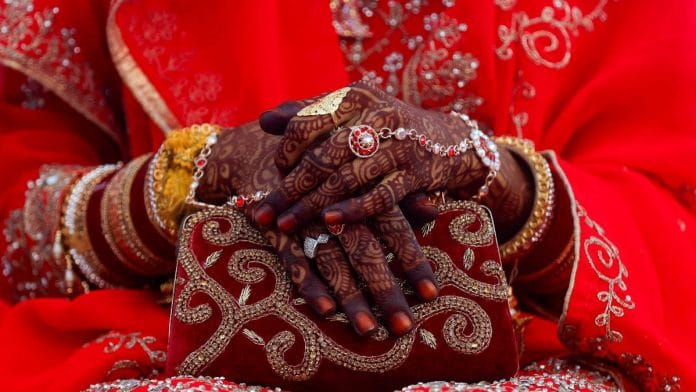New Delhi: The Delhi High Court is set to decide a key question: can children born in ‘kareva’ marriages—an arrangement in Haryana and Punjab, where a brother assumes responsibility for his brother’s widow without a formal marriage—legally claim a share in familial property?
Justice Anup Jairam Bhambhani will hear on 4 August a challenge to a 31 January order by the Dwarka district court in New Delhi, which refused to entertain a suit filed by a man challenging his step-siblings’ rights to his father’s property. The step-siblings were born from a ‘kareva’ marriage between the petitioner’s father and his aunt.
The Dwarka district and civil courts said the petitioner should have approached the court when the step-children were born in order to seek a restraint order against them. It said the petition was barred by limitation since the step-siblings were now adults.
The high court issued a notice to the opposite side on 19 May, and the question of the legal property rights of children born from ‘kareva’ marriages will be heard on 4 August.
‘Kareva’ marriages are also known as ‘chaddar andazi‘ marriages, a term that stems from the practice of a man placing a white sheet, or chaddar, on the head of a widow, indicating that a widow’s remarriage has taken place.
What are ‘kareva’ marriages?
A form of widow remarriage, ‘kareva’ marriages are prevalent among agrarian communities in rural parts of Haryana and Punjab, in which a widow marries her brother-in-law. The rationale behind this custom was to keep the property within the same family after the husband’s death.
Advocates Anil Malhotra and Ranjit Malhotra wrote in The International Survey of Family Law that although there is no dispute about the validity of such marriages, “one of the prime objectives of such a customary marriage is the rehabilitation of the widow within the family fold, and to retain the land holding within the family fold”.
“Since Karewa marriages emanate from the state of Punjab, which is known for its flourishing agriculture, the size of the land holdings has added significance for the family name. Land holdings in the state of Punjab are considered to be the pride of the family and more valuable than the family silver,” they said.
British lawyer and legal writer W.H. Rattigan wrote in his 1908 book, A Digest of Customary Law, that a ‘kareva’ marriage requires no religious ceremonies, and confers all the rights of a valid marriage.
Although the practice typically involves a widow marrying her husband’s brother, in some cases, it extends to other male relatives of the deceased husband as well.
The Hindu Marriage Act does not refer to ‘kareva’ marriages, but they are recognised by customs and have been validated by Indian courts through several judgments. Some rulings, however, have declared such marriages null and void.
However, there appears to be a legal grey area regarding the property rights of children born out of ‘kareva’ marriages.
The case at hand
The petitioner, based in New Delhi’s Najafgarh area, sought a permanent injunction against the step-siblings, while seeking an order restraining them from selling, transferring, alienating or creating any third-party interest in the property.
The petitioner is the grandson of the late Bhumidar Sardar Singh, whose property was divided three ways after his death, with each son getting a one-third share.
However, after one of the three sons passed away, his widow married his brother and the two had six children together. This ‘kareva’ marriage took place despite strong objections by the brother-in-law’s wife.
The first wife’s son is the petitioner and his step-siblings, from the second wife, are the defendants in this case.
The children from the first marriage approached the court seeking a declaration that “illegitimate” children, born out of the ‘kareva marriage’, have no rights to the family property, since the first marriage was subsisting.
According to the petitioner’s lawyer, Sriram Parakkat, his client and the step-siblings were living together, until their father passed away in 2012.
“Soon after his death, they started asking for a one-seventh share in the property. We, therefore, approached the civil court in Dwarka in 2013. But the civil court and the district court rejected our plea to pass an injunction order, following which we have approached the HC,” he said.
Past rulings in the matter
In 1975, the Delhi High Court, while hearing the Puran vs Angoori case, said that as long as the first wife was alive, the husband could not enter into a ‘kareva’ form of marriage, adding that a married man could not have a second marriage.
“A ‘kareva’ marriage is with the brother or some other male relative of the deceased husband,” the court said.
Neither party must have a spouse living at the time of the marriage, the court said, while adding that the man, Shankar’s marriage with Angoori was “null and void” and “non-existent”.
Rejecting the claim that such a marriage derives its validity from custom, the court said, “A custom must be proved by particular instances.”
It added that there wasn’t evidence of a single instance of ‘kareva’ marriage among the Banjaras, the community to which the parties belonged.
More recently, in the 2022 Punjab and Haryana High Court ruling in Bhola Ram vs. Mukesh Devi, the court noted that courts have previously held agricultural communities such as the Yadavs in Haryana entered into such marriages to provide “protection” to a woman who lost her husband.
In an earlier ruling in Suman vs State of Haryana (2020), the Punjab and Haryana High Court held that a widow who had entered into a ‘kareva’ marriage wasn’t eligible for pension under the Haryana Pension to Widows and Destitute Women Scheme Rules, 1988-1989 as she was longer a “destitute” and also remarried in the last three years.
(Edited by Sugita Katyal)
Also Read: SC asks Centre to get expert opinion on lifting blood donation ban on trans people, sex workers






